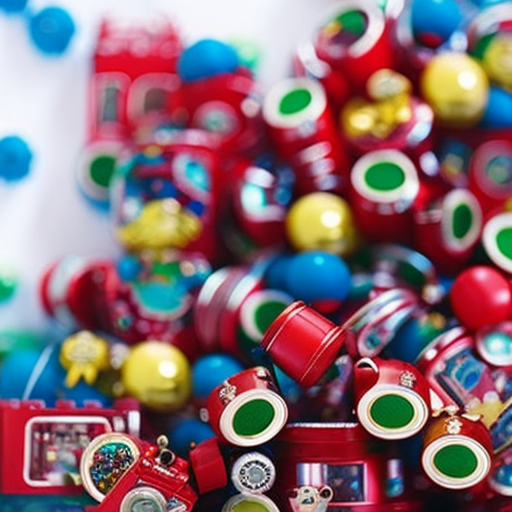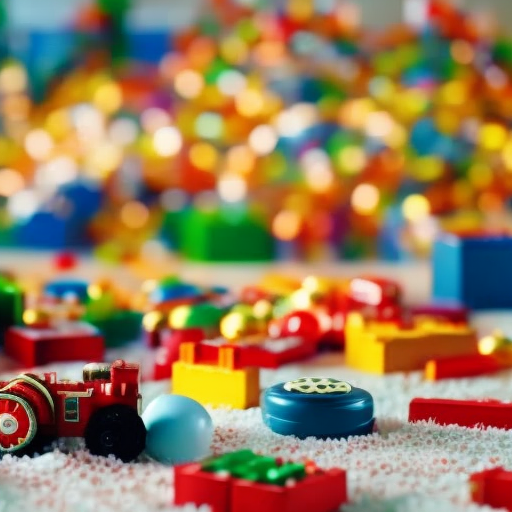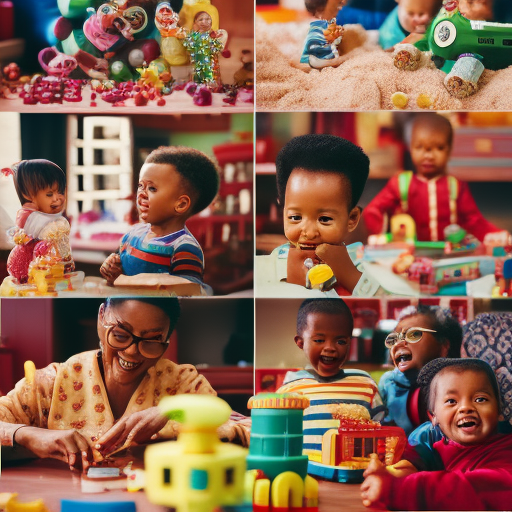"Cherishing Little Steps - A Haven for Baby and Family Journeys"
Selecting Quality Educational Toys
So, you want to find the perfect educational toys for your little one, huh? Well, you’ve come to the right place!
Selecting quality educational toys is no easy task, but fear not, my friend. With a little guidance, you’ll be on your way to finding the toys that will engage, stimulate, and educate your child.
From age-appropriate options to interactive features, we’ll explore all the factors that make a toy truly educational. Safety and durability? Check. Multifunctional and versatile? Absolutely. And let’s not forget the importance of learning through play.
So buckle up, because we’re diving into the world of quality educational toys, where fun and education go hand in hand. Let’s get started!
Key Takeaways
- Age-appropriate toys: Choose toys that align with your child’s age and consider their developmental milestones.
- Educational value: Prioritize toys that promote cognitive development and problem-solving skills, such as puzzles, building blocks, and board games.
- Safety standards: Choose toys certified by reputable organizations and prioritize safety above all else, considering potential hazards and selecting toys appropriate for your child’s age and stage.
- Interactive and hands-on features: Look for toys that incorporate interactive and hands-on features to stimulate sensory development and promote active learning.
Age-Appropriate Toys

Choose toys that are suited for your child’s age to ensure optimal learning and engagement. When it comes to toy safety, it’s crucial to consider your child’s developmental milestones. Age-appropriate toys are designed to cater to the specific needs and abilities of children at different stages of development. By selecting toys that align with your child’s age, you can provide them with opportunities for growth and exploration while keeping them safe.
Toys that are suitable for infants are typically soft, colorful, and easy to grasp. These toys are designed to stimulate their senses and encourage motor skills development. As your child grows, you can introduce toys that promote cognitive and problem-solving skills, such as puzzles and building blocks. By the time they reach preschool age, toys that encourage creativity, imagination, and social interaction become more relevant.
It is important to note that age recommendations on toys aren’t arbitrary. They’re based on extensive research and testing to ensure that the toys are safe and developmentally appropriate for children at specific stages. These guidelines consider factors such as choking hazards, small parts, and potential risks to ensure that your child can play safely while enhancing their learning and growth.
Educational Value
Consider the educational value of toys to ensure your child’s learning and development is maximized. When selecting toys for your child, it’s important to prioritize cognitive development and problem-solving skills.
Educational toys are designed to stimulate your child’s mind and promote learning through play.
Toys that promote cognitive development help your child build essential thinking and reasoning skills. Look for toys that require problem-solving, critical thinking, and decision-making. Puzzles, building blocks, and board games are excellent choices as they challenge your child’s mind and encourage them to think creatively.
Problem-solving skills are crucial for your child’s overall development. Toys that encourage problem-solving help your child develop logical thinking abilities, analytical skills, and the ability to find solutions. Building sets, science kits, and strategy games are great options to enhance your child’s problem-solving abilities.
By choosing toys that prioritize cognitive development and problem-solving skills, you’re providing your child with valuable learning experiences. These toys engage their minds, promote intellectual growth, and foster a love for learning. Remember to consider your child’s age and interests when selecting educational toys, as this will ensure they remain engaged and motivated.
Investing in educational toys not only provides entertainment but also lays the foundation for your child’s future success. So, empower your child’s learning journey by selecting toys that offer educational value and encourage their cognitive development and problem-solving skills.
Safety Standards
Ensure that the educational toys you select for your child meet rigorous safety standards to protect their well-being. When choosing toys, it’s crucial to prioritize safety above all else. To guarantee that the toys you purchase adhere to the highest safety standards, consider the following:
-
Certification requirements: Look for toys that have been certified by reputable organizations, such as the Consumer Product Safety Commission (CPSC) or the European Union’s EN71 standard. These certifications ensure that the toys have undergone rigorous testing to meet specific safety criteria.
-
Toy testing procedures: Familiarize yourself with the toy testing procedures that manufacturers follow. This includes assessing potential hazards, such as small parts that could pose a choking hazard, sharp edges, or toxic materials. Toys that have undergone thorough testing are more likely to be safe for your child to play with.
-
Age appropriateness: Always choose toys that are appropriate for your child’s age and developmental stage. Toys that are too advanced may have small parts that could be dangerous for younger children, while toys that are too basic may not provide enough stimulation for older children.
Durability and Quality
When selecting educational toys, it is important to prioritize durability and quality. You want toys that will last and withstand the wear and tear of playtime. High quality materials are key to ensuring the longevity of the toys. Look for toys made from sturdy materials such as wood, metal, or high-quality plastic. These materials are less likely to break or become damaged over time.
To help you make informed decisions, here is a table highlighting some examples of long lasting toys and the high quality materials they are made from:
| Toy | High Quality Materials |
|---|---|
| Wooden Blocks | Solid hardwood |
| Building Sets | Non-toxic ABS plastic |
| Puzzle Games | Thick, durable cardboard |
| Science Kits | Stainless steel components |
Interactive and Hands-On Features
To encourage engagement and active learning, look for educational toys that incorporate interactive and hands-on features. These types of toys not only capture your child’s attention, but also provide them with valuable opportunities for sensory development and the enhancement of cognitive skills.
Here are three reasons why interactive and hands-on features are essential in educational toys:
-
Stimulates sensory development: Interactive toys engage your child’s senses, allowing them to explore different textures, colors, sounds, and movements. This sensory stimulation promotes the development of their sensory processing skills, helping them to better understand and interpret the world around them.
-
Enhances cognitive skills: Hands-on activities require your child to think, problem-solve, and make decisions. By manipulating objects, solving puzzles, or building structures, they’re developing important cognitive skills such as critical thinking, spatial awareness, and logical reasoning.
-
Promotes active learning: Interactive toys encourage active participation and engagement. Instead of passively observing, your child becomes an active learner, taking control of their learning experience. This hands-on approach fosters a deeper understanding of concepts and promotes a love for learning.
When selecting educational toys for your child, prioritize those that offer interactive and hands-on features. By doing so, you’re ensuring that their playtime isn’t only fun but also beneficial for their sensory development and cognitive skills.
Multifunctional and Versatile Toys

Look for educational toys that offer multiple functions and can be used in various ways to maximize your child’s learning experience.
Multifunctional and versatile toys are excellent choices because they provide endless possibilities for creative play and help develop problem-solving skills.
These types of toys encourage your child to explore different ways of using them, promoting imaginative thinking and enhancing their cognitive abilities. Whether it’s a building set that can be transformed into various structures or a puzzle that can be solved in different ways, these toys offer a range of activities that keep your child engaged and challenged.
By engaging in creative play, children are able to express their ideas and emotions, fostering their communication skills and encouraging self-expression. They can build, create, and imagine, all while developing their fine motor skills and hand-eye coordination.
Furthermore, multifunctional toys also promote problem-solving skills. They require children to think critically and find solutions to challenges, helping them develop logical reasoning and analytical thinking. This type of play fosters resilience and perseverance as children learn to overcome obstacles and find different approaches to problem-solving.
Learning Through Play

You can enhance your child’s learning experience by incorporating play into their educational journey. Play isn’t just about having fun; it’s a powerful tool for cognitive development and the development of social skills.
Here are three ways in which play can benefit your child’s learning:
-
Promotes Cognitive Development: Play provides opportunities for children to explore, experiment, and problem-solve. It stimulates their curiosity and creativity, improving their cognitive skills such as memory, attention, and logical thinking. Activities like building blocks, puzzles, and role-playing games engage their minds and foster critical thinking.
-
Enhances Social Skills: Play encourages interaction and cooperation with others, helping children develop important social skills. Through playing with peers, they learn to take turns, share, negotiate, and resolve conflicts. Board games, team sports, and pretend play provide opportunities for children to practice communication, empathy, and cooperation, preparing them for future social interactions.
-
Provides Hands-On Learning: Play allows children to learn through hands-on experiences, making learning more meaningful and engaging. Toys and games that involve problem-solving, creativity, and experimentation enable children to explore concepts in a concrete and interactive way. This hands-on approach promotes better understanding and retention of information.
Engaging and Stimulating Designs
Engage your child with educational toys that feature stimulating designs. These toys not only provide entertainment but also foster innovative learning and creative exploration. When selecting educational toys, it’s important to consider the design elements that will captivate your child’s attention and encourage their curiosity.
Stimulating designs can include bright colors, interesting textures, and unique shapes. These features not only make the toys visually appealing but also engage multiple senses, enhancing the learning experience. For example, a puzzle with vibrant colors and different textures on each piece can encourage your child to explore and problem-solve.
In addition to visual and tactile elements, consider toys that incorporate interactive features. Toys with buttons, switches, or movable parts can provide hands-on learning opportunities, allowing your child to actively engage with the toy and develop their fine motor skills.
Furthermore, look for toys that encourage open-ended play and imaginative thinking. Building blocks, pretend playsets, and art materials are great options for fostering creativity and encouraging your child to think outside the box.
Parent Reviews and Recommendations

Consider seeking out parent reviews and recommendations when selecting quality educational toys. Parents who’ve already purchased and used certain toys can provide valuable insights and feedback based on their firsthand experiences. Here are three reasons why parent reviews and recommendations should be an essential part of your decision-making process:
-
Authenticity: Parents can offer unbiased opinions about different toy brands and manufacturers. Their reviews can help you gauge the quality, durability, and safety of the toys you’re considering. By reading parent reviews, you can get a sense of whether a particular toy lives up to its claims and if it provides a beneficial learning experience for children.
-
Real-life Application: Parents can share how their children have benefited from playing with educational toys. They can provide specific examples of how these toys have helped their child develop essential skills such as problem-solving, creativity, and critical thinking. By understanding the benefits that other children have experienced, you can make a more informed decision about which toys are best suited for your child’s development.
-
Community Support: Seeking out parent reviews and recommendations creates a sense of community and support. You can connect with other parents who share similar values and concerns about educational toys. Through online forums, social media groups, and parenting websites, you can engage in discussions, ask questions, and receive personalized recommendations from fellow parents.
Frequently Asked Questions
How Can I Determine if a Toy Is Suitable for Children With Special Needs?
To determine if a toy is suitable for children with special needs, consider if it promotes inclusive play and provides sensory stimulation. Look for toys that accommodate different abilities and engage multiple senses for a well-rounded educational experience.
Are There Any Specific Toys That Can Help Develop Social Skills in Children?
To develop social skills in children, there are specific toys that can help. Toys for developing empathy and improving communication skills are key. Consider toys that encourage cooperative play, role-playing, and problem-solving to nurture social interactions.
Can You Recommend Any Educational Toys That Promote Creativity and Imagination?
You should consider educational toys that promote creativity and imagination. These types of toys can benefit fine motor skills and encourage open-ended play, allowing children to explore and express their ideas.
What Are Some Factors to Consider When Choosing Electronic Educational Toys?
When choosing electronic educational toys, consider factors like age appropriateness, educational value, safety features, and durability. Additionally, determine if the toy is suitable for children with special needs by checking for accessibility options and adaptive features.
Are There Any Educational Toys That Can Help Children With Language Development?
There are educational toys that can aid in language development, such as interactive storybooks and alphabet puzzles. These toys for cognitive development and early literacy can help children build vocabulary and improve their language skills.
Conclusion
So, when it comes to selecting quality educational toys, remember that they should be age-appropriate, have educational value, meet safety standards, and be durable and of high quality.
Look for toys that offer interactive and hands-on features, as well as those that are multifunctional and versatile. Learning through play is crucial, so choose toys that engage and stimulate your child’s mind.
Consider parent reviews and recommendations to ensure you make the best choice.
Remember, finding the right educational toys is like finding a key that unlocks a world of knowledge and growth for your child.


